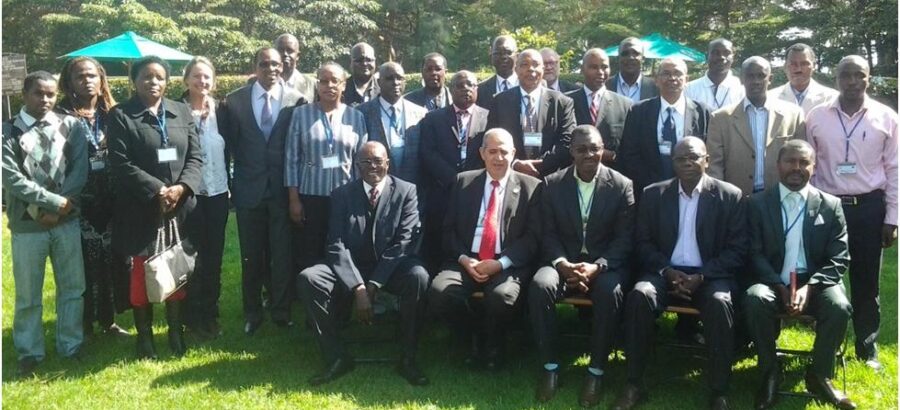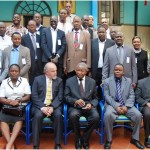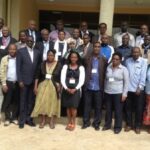- Introduction
In 2014, the African Union Bureau for Animal Resources (AU-IBAR) began enhancing focus on animal welfare in order to position it as a leading technical institution of African Union Commission (AUC) in the field of animal welfare. It is in this context that “Compliance with animal welfare standards” was included as one of the key results areas in its strategic plan 2014-2017 with the ultimate goal of enhancing the compliance of African Member States (MS) with animal welfare standards.
The focus will involve providing technical and institutional support to Regional Economic Communities (RECs) and AU MSs in understanding, reviewing and contributing to animal welfare standards setting process as well as including animal welfare matters in their national policies, legislations, strategies and programs related to the development and utilization of animal resources.
In order to identify and prioritize key issues and key interventions areas on AW and to develop an issues paper (IP) for the continental AW stakeholder consultative meeting, AU-IBAR organized in close partnership with World Animal Protection and The BROOKE the first animal welfare technical meeting 27th to 29th July 2015 at Fish Eagle Inn, Naivasha, Kenya.
Opening ceremony
The meeting was officially opened by the Director A-IBAR professor Ahmed Elsawalhy, who welcomed all participants to the meeting and wished them fruitful deliberations.
The Director commended the existing partnership between World Animal Protection and other partners and emphasized on the need for Africa to lead the way in promoting animal welfare (AW) within and emphasized the need for AU-IBAR to take the lead by providing leadership and resources. The director, however, observed that promotion of AW have not received adequate attention and resources especially in areas of policies and legislation, for much attention has been concentrated in the areas of companion and draught animals.
The Director said that in order to fill any existing gaps and improve advocacy, strategy and legislation in animal welfare, AU-BAR has taken AW as a key result area. This will lead to enhanced compliance of AW in Member States (MS).
The Sub-regional Representative for the OIE, Dr. Walter Masiga emphasized on the role of OIE in taking charge in giving recommendations and guidelines in animal welfare aspects. He said that OIE standards and actions have been developed and that the Scope of AW developed by OIE provides a framework for developing actions for AW. He emphasized the fact that AW standards should be science based and that copying and pasting AW regulations may lead to negative effects in terms of adoption and implementation.
Dr. Bouna Diop, Regional Manager of FAO ECTAD for East Africa, in his speech, looked at animal welfare as an ethical good and said that in the recent past, AW area has attracted increasing concern related to the requirements of AW standards in production and consumerism. Studies have quantified the economic value of AW and proved that if improved, it can contribute to economic wellbeing. It is also evident that any systematic attention to best practices in production systems can lead to increased productivity.
The Director, World Animal Protection, Dr. Williams Tennysons speech focused on misconception of animal welfare as a western concept. He said that unfortunately the twisted notion misleads and there was need to put in place necessary endeavors to examine the source of the notion in order to deal with it, since the misconception is part of the genesis of problems related to AW and as such, there is need to put AW agenda in Africa’s development.
In his speech, the Brooke Regional Representative, Fred Ochieng quoted from the book by George Orwell – ‘the animal farm’. He explained how the animals revolted against man whom they perceived to over work, taking everything for his own yet they are the ones that worked. Fred called on members present to strive to impact positively on the welfare of the animals, recognize their contribution to the economy of any country, and strife to make a difference to improve the welfare of all animals. He emphasized the need for stronger participation and collaboration amongst all animal welfare organizations.
Objectives of the technical meeting
The overall objective of the retreat was to initiate the development AW agenda for Africa with special emphasis on the increasing importance of compliance with OIE AW standards.
The specific objectives were the following:
- To identify key issues of AW in Africa
- To identify key issues of AW in livestock marketing and trade including at the quarantine stations
- To prioritize key issues of AW in Africa;
- To identify key interventions on AW in Africa;
- To develop an AW issues paper (IP);
- To discuss plans for the AW continental stakeholder consultative meeting;
- To discuss and adopt the TORs for the proposed African Platform for Animal Welfare (APAW).
- Participants
This involved various experts from AU-IBAR, FAO-ECTAD East Africa, stakeholders in livestock marketing systems from Djibouti, Ethiopia, Kenya and Tanzania; OIE-East Africa, World Animal Protection (WAP), African Network for Animal Welfare (ANAW) and the BROOKE, Donkey Sanctuary for Kenya and Ethiopia, IUCN, Pan African Animal Welfare Alliance (PAAWA).
Proceedings of the meeting
The proceedings of the meeting that was conducted for three enabled the participants to address the various topics in the agenda that included:
- The context of Animal Welfare in Africa (Livelihoods, Poverty Alleviation, Wealth Creation)
- Animal Production and Animal Welfare in Africa
- Animal Welfare and livestock trade and marketing in Africa
- Animal welfare activities of the OIE of relevance to Africa
- Animal welfare activities in Africa by various stakeholders including World Animal Protection, ANAW, The BROOKE East and West Africa, Donkey Sanctuary of Kenya and Ethiopia and ANAW
- Aquatic animal welfare: Issues and challenges for biosecurity and food safety
- Status of Animal welfare in Africa
- Presentation of ARIS e-forum discussion outcomes
- Animal Welfare and Disaster Risk Reduction (DRR)
- Animal welfare standards of the OIE and work programme of the AW working group.
- FAO AW activities in Africa and AW global perspectives
- Animal welfare policy landscaping and analysis in Africa
- Mainstreaming animal welfare in AU Livestock development Agenda (LiDeSA)
During working group sessions, participants debated the key issues and priorities and identified possible intervention areas to promote animal welfare agenda across the continent. The continental stakeholder consultative meeting for the establishment of African Platform for animal welfare (APAW) was also discussed.
Following fruitful discussions, the meeting deliberated and agreed on the following:
5.1. Key Animal welfare key issues and priorities Africa
Animal welfare is a growing concern that is gradually gaining relevance and application in social, economic, political and legal sectors. Further reflection within the current definition of animal welfare set by OIE, it is evident that some aspects of animal welfare has been practiced over time in different African systems and cultures though with varying levels that continue to add value to an ongoing debate on what constitute animal welfare. Currently, there exist different institutions and organizations both in public and private sectors that have adopted animal welfare within their mandate and to advance the development of best practices in animal welfare. The western developed countries have shown considerable implementation of animal welfare best practices and continue to influence to adopt these practices.
To a large extent, the increased concern on animal welfare in these countries, continue to influence consumer behavior, ethics and trade aspects putting more pressure on the rest of the world to address animal welfare issues. In line with this realization, animal welfare stakeholders in Africa are faced with a critical question of concern that of identifying key animal welfare issues in Africa and put together interventions to address them.
The following issues were identified and grouped in twelve (12) unique themes that form the key concerns for animal welfare in Africa as per the below table.
| Key Issue | Concerns |
| 1. Education and awareness | Ignorance, attitude change, culture, stereotyping, lack of awareness, knowledge gaps and relevant skills acquisition, capacity building |
| 2. Stakeholder’s engagement and involvement | Participation, consensus building, involvement, inclusivity, synergies, coordination |
| 3. Science and research | Evidence, advocacy |
| 4. Value chain | Value for AW (economic, non-economic, social etc.) production systems, trade and health |
| 5. Policy framework, guidelines strategies, and action plans | Lack of laws, inadequate laws, low/lack of enforcement,
Guidelines Strategies – regional, continental Domestication Best practices |
| 6. Husbandry practices | Indigenous and modern practices and knowledge in production |
| 7. Gender and Youth | Unemployment, drugs |
| 8. Implementation, enforcement and M & E | Validation of AW value, indicators of AW, enforcement, implementing structures/mechanisms |
| 9. Standards | Compliance, domestication, benchmarking |
| 10. Natural resource management | Droughts, disasters, competing use on natural resource, pressure on land |
| 11. Emerging areas | Climate change, drug abuse, other animals (wildlife, fisheries etc) |
| 12. Resourcing | Financial, technical, technological |
An ahdoc working group to further work on the identified key issues and priority areas to prepare the IP for the continental stakeholder continental meeting
5.2. ROAD MAP ANIMAL WELFARE AGENDA DEVELOPMENT
| Item | Activity | Responsible for the action | Timeline |
| 1 | Prepare and circulate the Report of this technical meeting (only the meeting participants) | AU-IBAR | 7 August 2015 |
| 2 | Feedback from participants | Participants | 11 August 2015 |
| 3 | Consolidation and wider dissemination of the report; including sending a save a date | AU-IBAR | 14 August 2015 |
| Mapping of key AW stakeholders | OIE, CVOs, BROOKE, WAP, ANAW and AU-IBAR | 25 August 2015 | |
| 4 | Establish AW Taskforce and the TOR | AU-IBAR (to nominate) – adhoc working group to progress as AU-IBAR formalizes | 14 August 2015 |
| 5 | Feedback from partners on taskforce (acceptance and focal point) | Partners/ Institutions | 21 August 2015 |
| 6 | e-forum on AW initiative for Africa | AU-IBAR to coordinate with taskforce (topics for discussions) | 1 -14 September 2015 |
| 7 | Preparatory meeting for CN, logistics including budget | Taskforce | 1 September |
| 8 | Finalise Concept paper for the continental meeting (drawn from this meeting) and proposed agenda and speakers | Taskforce | 20 September 2015 |
| 9 | Send invitation for the continental meeting | AU-IBAR (save a date to be sent by 14 August) | 21 September 2015 |
| 10 | Conduct the meeting in Addis Ababa | AU-IBAR + Partners | 11-12 November 2015 |
- Acknowledgement
The participants expressed their sincere gratitude to AU-IBAR for organizing this 1st technical meeting of special focus on animal welfare. They also thanked all the technical partners represented FAO, OIE, World Animal Protection, The Brooke, ANAW, PAAWA, Donkey sanctuary and IUCN for their contribution to the success of this event.
- Annexes
7.1. Proposed pre-taskorce
| SN | NAMES | INSTITUTION |
| 1 | Hiver Boussini | AU-IBAR |
| 2 | James Wabacha | |
| 3 | Edwards Nengomasha | |
| 4 | Annie Lewa | |
| 5 | Nelly Isyagi | |
| 6 | Bouna Diop | FAO |
| 7 | Patrick Bastiaensen | OIE |
| 8 | Fred Ochieng | BROOKE |
| 9 | William Tennyson | World Animal Protection |
| 10 | Samuel Theuri | ANAW |
| 11 | Calvin Solomon Onyango | Donkey Sancturary |
| 12 | TBD | IUCN |






